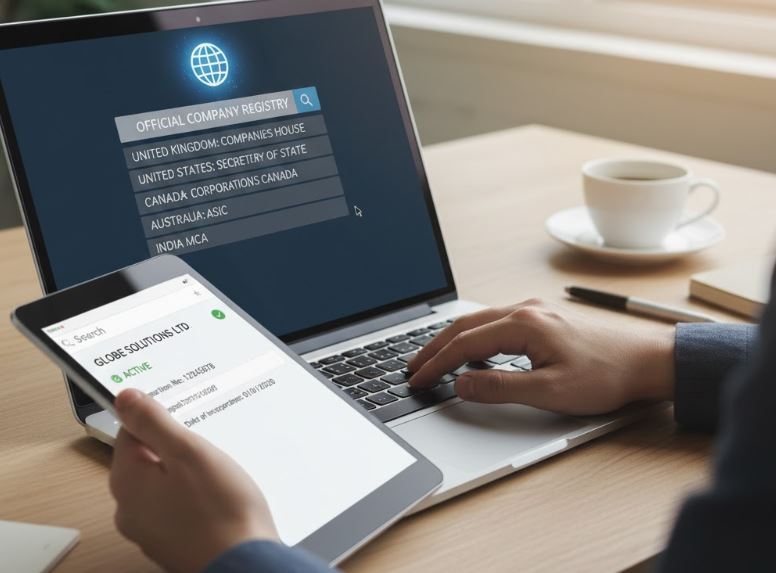The Relevance of Company Checkups
Trust and transparency have become crucial aspects of all business relationships in the contemporary business environment. Be it a new partnership, a contract or a cross-border trade, it is no longer an option as it is necessary to verify the legitimacy of a company. By assuring an official registration of a company, it gives one an assurance that the business is operating within the law of either the local or international laws. It also protects people and companies against possible fraud, scams or financial crime.
Having information about how to check if a company is legitimate enables the investors, customers, and business partners to make informed decisions. Due diligence in the initial level of engagement will save a lot of time, funds, and damaged reputation as corporate fraud and identity theft are on the increase. In the modern globalized economy, company verification is an important part of compliance and risk management.
The Importance of Checking Company Registration
One should always ensure that a company is registered with the relevant authorities before transacting business with any organization. An established business is a business that is registered by law and follows the laws in the jurisdiction, has a valid registration number and can be traced to the owners or directors. The checking company registration helps in ensuring that the business is a legitimate entity and it is liable to its operations.
Failure to undertake this step exposes businesses to a number of risks that include fraud, collaboration with fake businesses and engaging in money laundering activities. The basic company check can reveal discrepancies in business information, mis-matched ownerships or unauthenticated licenses. Finally, the registration confirmation prevents not only the authenticity but also provides the basis of credibility amongst organizations.
The Process of Company Registration
Every nation has an official register or database of businesses that have been incorporated under the law. Such registries hold sensitive details of the company, including its registration number, type of business, status, directors and information of the ownership. Checking company registration, to a greater extent you are probing these official records to make sure that the business is real and makes the operation within the fields of the law.
As a case in point, registered entities must submit annual returns, update ownership details and ensure that they document their business undertakings appropriately. Compliance with those regulations may result in being suspended or deregistered. Thus, when a business is listed on an official register with updated information, there are high chances that it is legitimate.
Also, other useful information may be obtained during the registration of the company, including the date of its inception, the address of its location, and the nature of its operations. This openness helps stakeholders to evaluate the stability and reliability of the company before signing contracts with it.
Checks to Confirm Registration of the Company
The use of a structured approach is important when determining how to check a business is legitimate. The initial phase is normally visiting the official business registry or database of the country where the company is based. Governments have made it easy to locate registered businesses using online portals where businesses are easily located by name, by their registration number or tax identification.
Through the company verification process, the users are able to see the legal name of the business, the date of its incorporation and its current status (active, dissolved, or suspended). This information can be cross-checked with other records like contracts, invoices or correspondence to find discrepancies which can lead to a fraudulent act.
It is also useful to check the physical address and contacts of the company. Genuine businesses tend to be trackable through their localities as well as operational communication. Any recent change of ownership or directorship which can be detected by checking can also show the presence of some hidden hazards since any sudden or unaccounted changes can indicate the efforts to hide the actual control.
Transparency in Business Legitimacy
Transparency of operations and ownership is a major criterion used to determine the legitimacy of a given company. Open businesses are also more reputable than ones that do not share information on their structure, finances, and management. In this respect, checking company registration is not only about the existence confirmation, but it is also about assessment of integrity.
Transparency in the corporation also brings about a more equitable market place since all parties are subjected to the same rules. It also assists the regulators in fighting financial crimes and it also enhances investor confidence. When organizations can readily establish the integrity of business partners, the degree of responsibility in the business ecosystem in general rises.
Future of Company Verification through Technology
As global business is changing with the digital transformation, so is the company verification. The emergence of new technologies that have automated and simplified the process of attaining legal registration, including artificial intelligence, data analytics, and automation, is here to stay. Automated systems now have the capacity of retrieving and analyzing company data in real-time and in official registries, contrary to manual checks that need days or weeks to be completed.
These inventions facilitate the process of company registration by organizations and help them verify their registration in an easy and precise manner. One can use digital verification platforms to identify the inconsistencies, cross-checking ownership information, and even track the changes in the company status. This will enable businesses to remain in control and identify threats way before they get out of control.
With tighter global regulations, automated verification tools will be extremely important in the due diligence of a corporation. Not only do they help to cut down manual workload, but also improve the accuracy of compliance assessment and allow quicker and more accurate business onboarding.
Establishing Credibility by Company Checks
Investigating whether a business is registered or not is not all about a legal critical obligation but a long-term trust creation. Transparency is the key in any successful partnership. Companies can also ensure that their business transactions remain safe, ethical and within the law, by always establishing the authenticity of the potential clients, vendors, and partners.
The ability to evaluate the legitimacy of a business will give the stakeholders the capacity to make good decisions and prevent the traps that may lie in the way. Since companies are constantly growing internationally and the industries are ever-evolving, this vigilance will still be critical in defending the reputation of the brands and guaranteeing long-term growth.
Conclusion
Checking company registration is an essential aspect of contemporary business integrity. In a world that is rapidly becoming the digital world, with new companies starting everywhere, the ability to check with the company registration within a short duration and with accuracy is to ensure transparency and security. It enables the individuals and organizations to be sure that they are doing business with legitimate and recognized businesses.
Finally, an established business relationship is a trustful one. With the current evolution of technology, automation, accuracy and accessibility of company verification will remain the focal point in the future, so that all transactions, partnerships, and collaboration are founded on the truth and the trust of validity.





